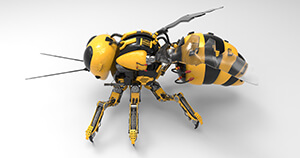In recent years, we have heard a ton about “saving the bees”. What exactly is the huge importance of bees in our ecosystem? Bees are essential for the pollination of many plants or crops that make up our food supply such as fruits, vegetables, nuts, and seeds. They also help maintain biodiversity through the pollination process. Without bees, we’d be in big trouble in regards to our food supply and the diversity in our ecosystem, and we’d be without the production of honey. The “Saving The Bees” phrase came about to bring awareness to the major decline in the bee population in recent years. In 2016, the United States lost 44% of all its honeybee colonies—yes, it’s that bad. These declines are mainly caused by habitat loss, pesticide use, and disease: most caused by human intervention. However, a fairly recent innovation has proven to be useful in terms of the pollination of our crops and plants: robot bees.

Researcher Eijiro Miyako from Japan’s National Institute of Advanced Industrial Science and Technology invented an insect-sized drone that could artificially transfer pollen from one plant to another. Using an ionic, eco-friendly gel and horse bristles to mimic a bee’s fur to carry the pollen from one plant to another, the vision was deemed successful through the use of this gel on live subjects such as ants. However, the focus moved to implementing these features on tiny drones. Now what is the motivation for this?
“Although artificial pollination is already possible, it’s a tedious, time-consuming process. When done by hand, using a brush to apply the pollen, a person can pollinate five to 10 trees a day, depending on the size of the trees. Tackling thousands of trees takes major manpower and a hefty budget,” says Crystal Ponti from NPR.
Not only is Eijiro Miyako developing this idea, but researchers at Harvard’s Wyss Institute for Biologically Inspired Engineering are taking the lead on this new development and not only bees, but other robotic insects. According to researchers at the Wyss Institute, the development of these bees consists of three main components, which are the body, the brain, and the colony.
The functionality of these bees can be broken down into these parts: “Body development consists of constructing robotic insects able to fly on their own with the help of a compact and seamlessly integrated power source; brain development is concerned with “smart” sensors and control electronics that mimic the eyes and antennae of a bee, and can sense and respond dynamically to the environment; the Colony’s focus is about coordinating the behavior of many independent robots so they act as an effective unit,” describes the Wyss Institute.

Although this innovation seems like it’s well in the works, there are some issues that arise with its creation. Because of the size of these bees, which are only a few inches, the power of the batteries used aren’t as efficient as they would like them to be in terms of power-to-mass ratio. Not only this, but because of their size, the robotic bees movement through the air would not be as precise as needed through the use of human controllers. Clearly, “robobees” are a work in progress in terms of development and testing, but from a social and ethical standpoint, there are lots of reasons as to why people stand against it.
According to Simon G. Potts et al., drones will never be sufficient enough to replace the value of real bees in biodiversity: “We highlight that emerging technologies have many beneficial roles to play in society, but in this case there is no justification for needlessly trying to replace a key component of biodiversity which can readily be protected and enhanced.”
Their argument mainly lies on 6 reasons: artificial pollination by robots is far from being able to replace bees to pollinate efficiently, it would not be economically viable, negative environmental effects, potential damage of wider ecosystems, erase the value of biodiversity, and could lead to major food insecurity. Overall, it’s important to note that if we solve problems like these using technological alternatives, it could prove detrimental to our biodiversity and initiate a chain reaction of global disaster. Although it could work, how will this affect the future of our planet?